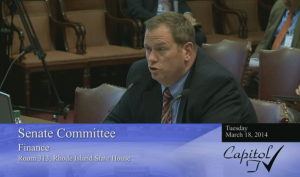 Since Rep Nick “Jobs and Economy” Mattiello has risen to the throne of speaker of the house, there seems to be a wave of pro-corporate, anti-human legislation making its way through the halls of the Marble Monolith, and quickly. The latest of these ‘improve-the-business-climate’ bills to bubble to the greasy surface of the General Assembly is Senator Daniel Da Ponte’s legislation to reduce the corporate tax rate in Rhode Island.
Since Rep Nick “Jobs and Economy” Mattiello has risen to the throne of speaker of the house, there seems to be a wave of pro-corporate, anti-human legislation making its way through the halls of the Marble Monolith, and quickly. The latest of these ‘improve-the-business-climate’ bills to bubble to the greasy surface of the General Assembly is Senator Daniel Da Ponte’s legislation to reduce the corporate tax rate in Rhode Island.
Frankly, I’m getting really tired of debunking the idea that reducing the corporate tax rate will do anything to revive the stagnant economy in Rhode Island but, in the immortal words of David Coverdale, “Here I go again, on my own. Going down the only road I’ve ever known.”
In a press release, dated May 6, 2014, Senate Finance Committee Chair Daniel Da Ponte says that he will introduce legislation to reduce the corporate tax rate from nine to seven percent, beginning in 2015. There are several telling – and disturbing – passages in the release. The first passage that pricked up my progressive ears and raised my journalistic hackles was this.
Chairman Da Ponte developed the legislation, with assistance from the Rhode Island Public Expenditure Council, following a series of meetings with large employers from a cross section of industries.
Hmmm, meeting with “large employers.” I’m going to guess that doesn’t mean small business men and women that happen to be portly. Let’s just assume that the “largest employers” in R.I. are those that occupy the top six tax brackets. According to the R.I. Division of Taxation, there are 2,144 businesses in those six brackets. I don’t want to downplay the importance of these large businesses on our economy, but on the other hand there are 47,555 businesses in the bottom two tax brackets. I’m no economist, but it seems to me that if one wanted to have a significant and broad impact on businesses across the state, one would focus their attention on the most significant and broadest swath of businesses, that is, small businesses.
I’m going to write the next sentence in bold caps so that everyone understands the situation, and, yes, I am “internet yelling.”
THE ONLY SECTOR OF RHODE ISLAND CORPORATE ENTITIES THAT PAY ANYWHERE NEAR NINE PERCENT INCOME TAX ARE BUSINESSES THAT POST LOSSES OR EARNINGS UNDER $250,000 PER YEAR!
Did you get that? Only the smallest businesses in RI actually pay anything vaguely resembling the 9 percent mandated by our tax code, and then some. In fact, the 18,390 Rhode Island businesses that posted adjusted net losses of $161,284,348,417 actually paid $10,181,122, which is an astronomically high tax rate. To put that in perspective, the 214 businesses in the top bracket – earning $500 million or more – and whose adjusted income was a whopping $344,338,188,611, paid only $18,641,027; a mere .00541 percent.
Tom Sgouros has an Op-ed on the Providence Journal today which breaks down this misconception nicely. Sgouros writes, in response to his recent debate with right-wing hack-conomist Stephen Moore, who advocated for reducing the corporate tax:
“Moore was apparently unaware that a Democratically-controlled legislature could act this way, and went on to talk about Rhode Island’s corporate income tax, calling it among the highest in the nation. Well, yes, the rate is the fourth-highest, at 9 percent. But in reality, the tax is so riddled with exemptions and credits that 94 percent of businesses pay only the minimum. The tax will raise $133 million next year, and according to the Division of Revenue, 42 percent of the exemptions and credits are worth $83 million. (They have no idea how much the remaining exemptions and credits cost us.)”
Maybe this wouldn’t be so bad if the words, ‘Small business is the lifeblood of the Rhode Island economy’ fall lugubriously from so many willfully ignorant or intentionally deceitful elected officials’ lips. My question is this: If 94 percent of corporations already pay only the minimum tax rate, which I believe is 4.5 percent, what impact does reducing the rate from 9 to 7 percent have? The answer is simply this: none. Da Ponte is quoted in his release as saying:
“A two percentage point reduction in the corporate tax dramatically improves Rhode Island’s competitive position nationally and regionally. After meeting with more than a dozen important corporate partners, I’m convinced this will improve the business climate here. This allows existing companies to expand, and helps to attract new companies and new jobs to our state.”
Is Sen. Da Ponte really that gullible? After meeting with the folks that stand to benefit from the reduction , he’s “convinced” that this will help the Rhode Island economy? Maybe I’m missing something here, but I fail to see how this move will benefit anyone except those 2,144 large corporations which, by the way, represent only 3.65 percent of all Rhode Island businesses, and already pay well below 9 percent in income taxes. The release also states that:
The bill would shift Rhode Island to a single-sales factor apportionment formula, calculating a corporation’s tax based on its sales in Rhode Island versus its total corporate and affiliate sales.
This very well could be an important piece of the puzzle when it comes to righting our economic ship, but only if the same standards are applied to small businesses that sell and ship products out-of-state. The state’s historical propensity to screw the small businessperson gives me little hope that this will actually be the case if the bill passes.
There is one bright spot in the bill, however. There is a provision to introduce combined reporting to multi-state businesses that are headquartered in RI. Bob Plain has done a nice job right here on RI Future of outlining the benefits to our state of combined reporting for RI-based companies that do interstate and international business.
But hey, don’t take my word for it. You can see the 2012 corporate tax revenue table for all Rhode Island businesses here. The table lays it all out in black and white; or red, if you’re one of the 18,000-plus small businesses that posted a loss in 2012. Math was never my strong suit, but it seems to me that Da Ponte’s numbers don’t add up. This is just another case of the Rhode Island legislature fellating Big Biz, while continuing to screw small business sans lubrication.
]]> Gina Raimondo proposes allocating $60 million to fix up schools. As Sam Bell writes, she doesn’t say where the money will come from, only that the legislature will find it somehow.
Gina Raimondo proposes allocating $60 million to fix up schools. As Sam Bell writes, she doesn’t say where the money will come from, only that the legislature will find it somehow.
Gina Raimondo’s campaign manager, Eric Hyers, tells Phil Marcelo of the Providence Journal:
“This $60 million figure we’re talking about? To put it in context, we’re talking about 0.7 percent of the budget. What is more important than building schools that are new, safe, modern and help kids learn?”
Eric’s experience is in federal campaigns, so we can excuse the fact that he is obviously unfamiliar with the ferocity of fights at the State House over far less money than this. So here is a helpful list for him to consider of things that people might consider to be as important as building new schools:
- Staffing existing schools,
- Buying books and desks in those existing schools,
- Funding food stamps,
- Helping homeless or threatened children find a place to sleep,
- Paying unemployment benefits,
- Taking care of the psychiatric patients in the state’s care,
- Keeping bridges from collapsing,
- Reining in tuition increases at URI,
- Cleaning up sewage overflows,
- Keeping the lights on at the state hospitals,
- Keeping the state police on the highways,
- Staffing the prisons,
- Running the DMV,
- Keeping drinking water safe,
- Providing flu vaccines,
- Providing speedy trials to defendants
The fact is that you don’t get something for nothing. Repairing schools is a worthy goal. Pretending you can do it for free is how we got ourselves in the fiscal crisis we’ve been in for a decade. If someone has an idea about where the waste is, then let’s hear it. In the meantime, let’s not waste more time with magic money proposals.
Again, Eric’s strong suit is not the state budget, so here are some suggestions he could recommend for paying for this new expense. Some people would even consider items in this list to represent waste. Maybe he’ll mention them to Gina.
- Establishing combined reporting would raise about the right amount of money from big corporations doing business in Rhode Island. And
- According to last fall’s report, we pay $45 million to only 18 hedge funds to manage pension funds, out of $70 million in fees annually.
- According to my calculations, going back to the income tax rates of, say, 1996 would raise around $100 million per year.
- State tax credits (film and historic) waste tens of millions of dollars each year, money that goes to cutting the taxes of a rich person or corporation without any public benefit.
The last one there deserves special attention. When the historic tax credit program was ended a few years ago, our state borrowed money to repay those credits. The total amount borrowed was $150 million. Given the way the tax credits work, around $30-40 million of that was borrowed only to lower the taxes of people who had bought tax credits. That is, we borrowed to make a tax cut. If that’s not waste worth cutting out of state government, what is?
]]> Rhode Island missed out on somewhere between $40 and $100 million in 2011 and 2012, according this new report. That’s because in 2011, the General Assembly rejected Gov. Chafee’s idea to implement what is known as “combined reporting” for corporate taxes and instead called for the aforementioned report.
Rhode Island missed out on somewhere between $40 and $100 million in 2011 and 2012, according this new report. That’s because in 2011, the General Assembly rejected Gov. Chafee’s idea to implement what is known as “combined reporting” for corporate taxes and instead called for the aforementioned report.
The study found that combined reporting would have earned Rhode Islanders between $23 and $54 million in 2011 and between $21 and $44 million in 2012, depending on the accounting method used. The larger number focuses on just sales while the smaller number also factors in payroll and property. Read the overview here and watch video from last night of state Division of Taxation employees explain it the Senate Finance Committee.
Combined reporting combats the corporate practice of doing business in one state and utilizes the tax advantages of another state. The Institute for Taxation and Economic Policy called combined reporting “the most effective approach to combating corporate tax avoidance.” 23 states and the District of Columbia use combined reporting, including most New England states.
Rep. Teresa Tanzi, a progressive Democrat who represents Narragansett and South Kingstown, has sponsored legislation this year and in the past two legislative sessions that would implement combined reporting.
“The fundamental justification for combined report is a robust corporate tax that can’t be gamed by aggressive corporate tax planning while creating a level playing field between big multistate corporations and smaller, local corporations,” she said in an email to me. “Nonetheless, I am gratified that the study confirmed that Combined Reporting would give a modest boost to revenues that could be used to help the state address its unmet needs, and we now have the numbers to show the advantage certain corporations have.”
Most local businesses would not be affected by combined reporting, according to the study. It found 28 percent were negatively affected and 6 percent experienced a tax advantage.
“Any company that has a large presence here, property and payroll, is not really affected,” state Tax Director Dave Sullivan told the Senate Finance Committee last night. “companies that do not have a big footprint here and have maybe one or two retail outlets here may actually see an adverse affect in tax increases with single sales factor. If all their property and payroll are out of state and they have a significant number of sales because they have, we use the example of big box stores here in this state…”
Massachusetts and Vermont both implemented combined reporting in the same year they lowered their overall corporate tax rate. State tax officials told the Senate Finance Committee both states improved their Tax Foundation rankings after doing so.
]]>